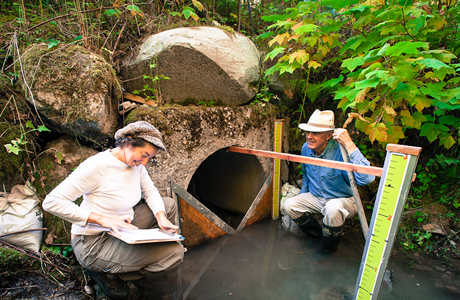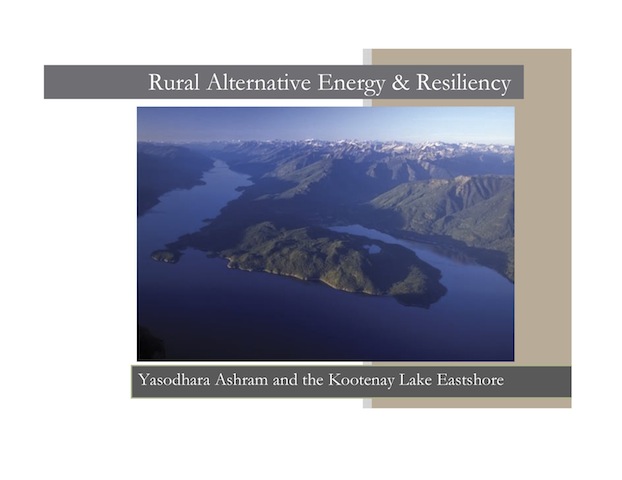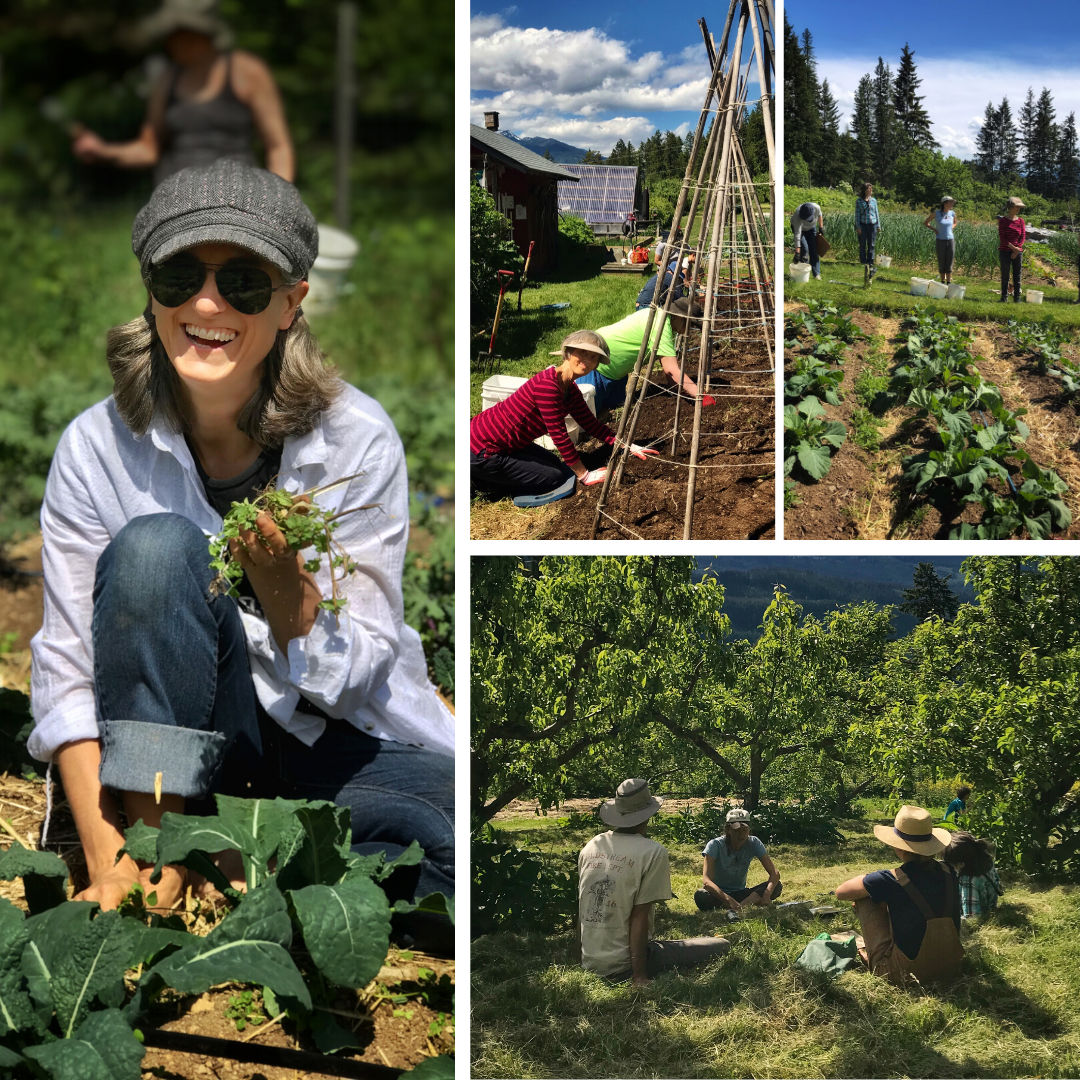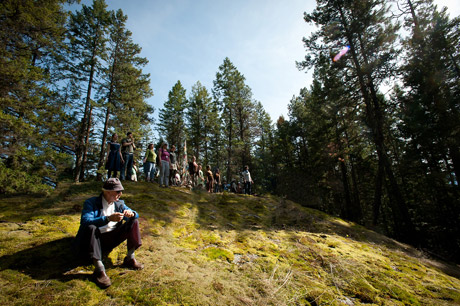SUSTAINABILITY: LIVING WITH AHIMSA (NON-VIOLENCE)
Living with awareness in both the inner and outer worlds, Yasodhara Ashram is deeply committed to participating in sustainable environmental practices. The Yasodhara Ashram Land Ethic states our commitment “to honour the sacred unity of life and to live in relationship with the natural world through this land, in a spirit of reverence and joy.”
 From the Ashram’s perspective, environmental action is an important part of our social responsibility and ecological integrity, a practice of the basic yogic principle of ahimsa.Connecting with nature is many people’s first experience of a deep and meaningful dimension to life. In silence and undisturbed natural settings, the clutter of our modern life is absent. The reason Swami Radha located the Ashram to this land was so that visitors could take a step out of the busy world and return to a more natural rhythm. The natural environment at the Ashram – the fresh air, clean lake, wildflowers, gardens and forests – provides a unique setting for spiritual reflection and growth.
From the Ashram’s perspective, environmental action is an important part of our social responsibility and ecological integrity, a practice of the basic yogic principle of ahimsa.Connecting with nature is many people’s first experience of a deep and meaningful dimension to life. In silence and undisturbed natural settings, the clutter of our modern life is absent. The reason Swami Radha located the Ashram to this land was so that visitors could take a step out of the busy world and return to a more natural rhythm. The natural environment at the Ashram – the fresh air, clean lake, wildflowers, gardens and forests – provides a unique setting for spiritual reflection and growth.
We are committed to maintaining the health of the land so that it continues to inspire spiritual growth. We are committed to being a model for sustainable living, ensuring the Ashram is environmentally resilient and an inspiration to others like us, who wish to leave this Earth better than how we found it.
To do this, we have taken the steps necessary to reduce our carbon footprint and are now a Carbon Neutral community. We are engaged in organic and biodynamic growing, to feed our guests and residents, and we care for the biodiversity of our land, allowing nature to thrive.
Rural Alternative Energy & Resiliency
 Energy resilience and renewable energy alternatives continue to be a primary concern on the East Shore of Kootenay Lake – a remote area vulnerable to frequent power outages and on the far end of a single line power grid.
Energy resilience and renewable energy alternatives continue to be a primary concern on the East Shore of Kootenay Lake – a remote area vulnerable to frequent power outages and on the far end of a single line power grid.
Eva Snyder, a long time karma yogi and 2012 YDC graduate, prepared the Rural Alternative Energy & Resiliency Report, the result of a 2013 Teck Service Learning Internship grant.
Eva presents her assessment of available renewable energy alternatives such as photovoltaics, micro-hydro, bio mass, geo-thermal and wind, for residential and community scale systems. We have light and water in abundance. The question is, how can we harness these resources for energy in ways that are respectful of the environment, natural eco-cycles, and the beauty of our surroundings on the east shore?
Read the full report here (PDF 1.7MB) and consider your options for sustainable and renewable energy.
———————–
Following the publication of the Rural Alternative Energy & Resiliency Report, Fall 2013, Eva Snyder, a long time karma yogi, 2012 YDC graduate, prepared the Guide to Eastshore Energy Sources. The report and the guide are the outcome of a 2013 Teck Service Learning Internship grant.
As Eva writes in the introduction, Kootenay Lake Eastshore is rich in natural resources. Sunlight, water, and forest can each provide the energy needed to light and heat homes and businesses – this is especially relevant as electricity prices continue to rise. Money spent in electricity price increases could instead be invested in the community through renewable energy start-up’s, beginning to gain autonomy from the grid, and generating income to reinvest. The Eastshore could own and operate its own renewable, clean energy generating facility.
Community-owned renewable energy projects can also create stable employment, through maintenance and monitoring. The technologies presented in this guide were chosen for their ability to draw on these resources efficiently, with less impact on the local environment.
By focusing in on this small group of technologies the guide aims to highlight the possibilities in our natural surroundings. This at the same time issues of long-term grid stability are addressed, and independent management of our own generation of energy are explored.
Each technology has varying degrees of feasibility, and this is outlined in its description, as well as general information for those who are unfamiliar with renewable energy.
Two versions of the Guide to Eastshore Energy Sources are available to you:
Click here to view PDF 3.0MB online.
Click here for a printable version (PDF 3.0MB)
A Carbon Neutral Community
 Yasodhara Ashram has a clear commitment to environmentally responsible practices, from planning and design to all areas of its operations. The outcome of this commitment was that Yasodhara Ashram was certified a Carbon Neutral community in the fall of 2012.
Yasodhara Ashram has a clear commitment to environmentally responsible practices, from planning and design to all areas of its operations. The outcome of this commitment was that Yasodhara Ashram was certified a Carbon Neutral community in the fall of 2012.
Yasodhara Ashram has been involved in green practices since the 1970s, initially implementing the 3Rs program (Reduce Reuse Recycle) and practicing organic gardening and composting. We launched a vast program of upgrades and retrofits of our buildings in the 1990s, and in the 2000s included the installation of geothermal and solar heating systems.
In 2008, the Ashram more specifically committed to a new, ambitious five-year program in response to a growing global environmental crisis. The Ashram’s goal was to be carbon neutral by 2013, our 50th anniversary, a goal we achieved.
To do this, Ashram developed a comprehensive program of sustainability that embraces menu planning, food ordering, green housekeeping, photo voltaic (PV) panels, solar and geothermal heating systems, and carbon offsets for guest travel. Timeless Books, our publishing house, prints on 100% PCW paper at a carbon neutral facility in BC, and our Ashram Bookstore stocks items from companies that exhibit sustainable practices.
The Ashram’s track record is at the leading edge of the worldwide movement to prevent and reduce environmental impacts. In response to our efforts, the Ashram was awarded the FortisBC PowerSense Conservation Excellence Award in 2008, for our commitment to reduce energy consumption by adapting innovative and efficient technologies and solutions. In 2009 we were awarded the coveted Environmentally Responsible Tourism Award from Tourism BC that acknowledges outstanding leadership in environmental sustainability.
Guests and staff have greeted the sustainability program with enthusiasm, inspiring the Ashram to go beyond measures to increase efficiency and reduce operating costs or qualify for government rebates. The Ashram will pioneer far-reaching changes that go beyond on-site operations and business practices. Although higher capital expenditures are often called for, the long-term benefits make these investments in our future worthwhile, and necessary.
Learn more about how our community was certified carbon neutral:
News release (Yasodhara Ashram: The path to a lighter footprint)
Carbon neutral backgrounder
Carbon neutral Q & A
Farm & Garden
 At the Ashram, we nurture over 2.5 acres of organic gardens and orchards. The garden is a place of beauty, nourishment, devotion and learning.
At the Ashram, we nurture over 2.5 acres of organic gardens and orchards. The garden is a place of beauty, nourishment, devotion and learning.
The wealth of fertile soil, flowers, bees, trees, birds, vegetables and fruit is a direct result the loving attention and hard work of many garden Karma Yogis over the years. Many look forward to spending their summers in the garden, picking fruits and vegetables, weeding and caring for the earth. Everyone who works in the garden or has spent time at the Ashram has come away with a greater appreciation of local, seasonal and organic.
Our garden produces 20% of the food we eat, 11,000 meals out of the 55,000 we serve annually. Ashram menus are based on what is available seasonally from our garden. We also winter store, freeze, dry and preserve as much produce as possible.
In an aim to reduce our carbon footprint and support the local economy, the Ashram purchases vegetables, fruit, honey, eggs and cheese from local farmers and orchardists. We support many local growers through CSA programs (community supported agriculture) and work trade.
The kitchen-garden team keeps updated on food sustainability initiatives that are happening locally and globally. We are actively engaged in seed saving, companion planting, composting and permaculture principles. Our guiding ideal behind the garden is a reverence for life.
Land Stewardship
 The land comprising Yasodhara Ashram is a sacred trust, both a thriving natural community and a flourishing spiritual community. The yogic teachings offered at Yasodhara aim to develop awareness and bring quality to the lives of all who come here.
The land comprising Yasodhara Ashram is a sacred trust, both a thriving natural community and a flourishing spiritual community. The yogic teachings offered at Yasodhara aim to develop awareness and bring quality to the lives of all who come here.
This includes developing an expanded awareness of our relationship to the land, and bringing our highest ideals into that relationship.
Set on 115 acres of land in the Purcell mountain range of southwestern BC, Yasodhara Ashram is located on the shores of Kootenay Lake. Kootenay Lake is a widening of the Kootenay River and is one of the largest natural lakes in British Columbia. Wildlife is abundant. Bear, deer, elk, moose, coyote, cougar, streams, wildflowers, mosses, mature and old-growth forests are just some of the diverse living elements of this land.
As a community, we are asking, How can this land serve the teachings that were the purpose for the Ashram coming here? How can the land itself be served?
While we garden organically and function as a carbon neutral community, we are also placing importance on increasing our conscious knowledge of the land we occupy. We are currently creating a detailed land-map and recording all flora and fauna that we share our home with.
In our role as caretakers for this land, the Ashram is committed to exploring questions such as: How can we contribute to biodiversity protection? Minimize destruction and fragmentation of our forests? Protect and preserve healthy soils? Reduce water use at the Ashram and prepare for climate change?
We look to offer a viable model of living harmoniously with the land, demonstrating how humans can live with the natural environment in ways that support all parts of the system: people, plants, animals, water, soil and air.
Working Together: Resilience for Now and Future Generations
Yasodhara Ashram Land Ethic
Yasodhara Ashram is comprised of 115 acres on the east shore of Kootenay Lake, in the interior rain forest of the Purcell Mountains of British Columbia.
Our Commitment
We commit to honour the sacred unity of life and to live in relationship with the natural world through this land, in a spirit of reverence and joy.
The Yasodhara Context
The land of Yasodhara Ashram is a sacred trust. The teachings offered here develop awareness and bring quality to life, which includes expanding awareness of our relationship with the land and bringing quality into that relationship.
Purpose of Our Land Ethic
Our land ethic is a reminder that:
- we agree to take responsibility for our actions on the basis of consciously chosen guidelines
- we recognize our membership in a community of interdependent parts, human and non-human
- we acknowledge the intrinsic right to life and being of all components of that community
- we recognize the earth as a complex interacting living ecosystem whose inhabitants co-evolve together in a web of relationships
What We Offer
- A viable model: Healthy land becomes a good model in the same way that healthy people living purposeful lives model a different way to live.
- Connection: We want to demonstrate how humans can live with the natural environment in ways that support all parts of the system—people, plants, animals, water, soil and air.
- Happy Listening: We offer the opportunity to commune and to listen deeply, to hear the still small voice within and the subtle voice of the natural world.
- Wholeness: In tending to the work and to our relationship with the land in reverence and gratitude, we serve the essential unity and sacredness of all life.
Ideals that Guide Our Action
- Reverence/Respect for life; Ahimsa – non-injury.We honour the intrinsic right to life of all beings and respect the integrity of all aspects of the land community—the animals, water, soil and air.
- Service – Karma Yoga – Yasodhara Ashram is a Karma Yoga ashram where the efforts of our work are based on giving our best without consideration of reward. We are exploring how our service to the land can expand, while also recognizing how the land serves us.
- Gratitude – We understand our role as stewards of these teachings and of the land. We are grateful for the privilege of living in this beautiful refuge.
Ideals in Action
- Learning: We recognize that our relationship with the land is a process of learning. We want to keep making wiser decisions. We are committed to reflecting on our actions, learning from them and engaging in a cycle of action-reflection-response.
- Relationship: Knowledge and understanding of the land is acquired through a long period of observation and interaction. We are committed to striving toward a more mature understanding.
- Heart and Mind: We acknowledge the need for knowledge based on experience and understanding of both heart and mind. The practices offered at the Ashram contribute to bringing awareness and quality to life, which includes building our capacity to respond to the land with both intuition and reason.
- Choices: Putting ideals into action requires us to make conscious choices to:
- Use what supports health of land, air, water, soil; avoid what does not. We garden organically using agriculture that is sustainable for the ecosystem and for human communities. We use cleaning products that are ecologically sustainable.
- Reduce waste. We compost, recycle, re-use and restrain from consuming products with excess packaging. We hold to an ideal of zero waste and work towards this.
- Practice energy sustainability. The Ashram is now certified carbon neutral! We are working toward zero net use by replacing fossil fuel vehicles with electric ones and seeking ways to supplement energy use with wind, turbine and other sustainable sources. Geothermal and solar energy are well established.
- Education: We create and offer ongoing programs that educate others in the power of choice. Through active involvement, participants also experience how sustainable practices can be applied and lived.

